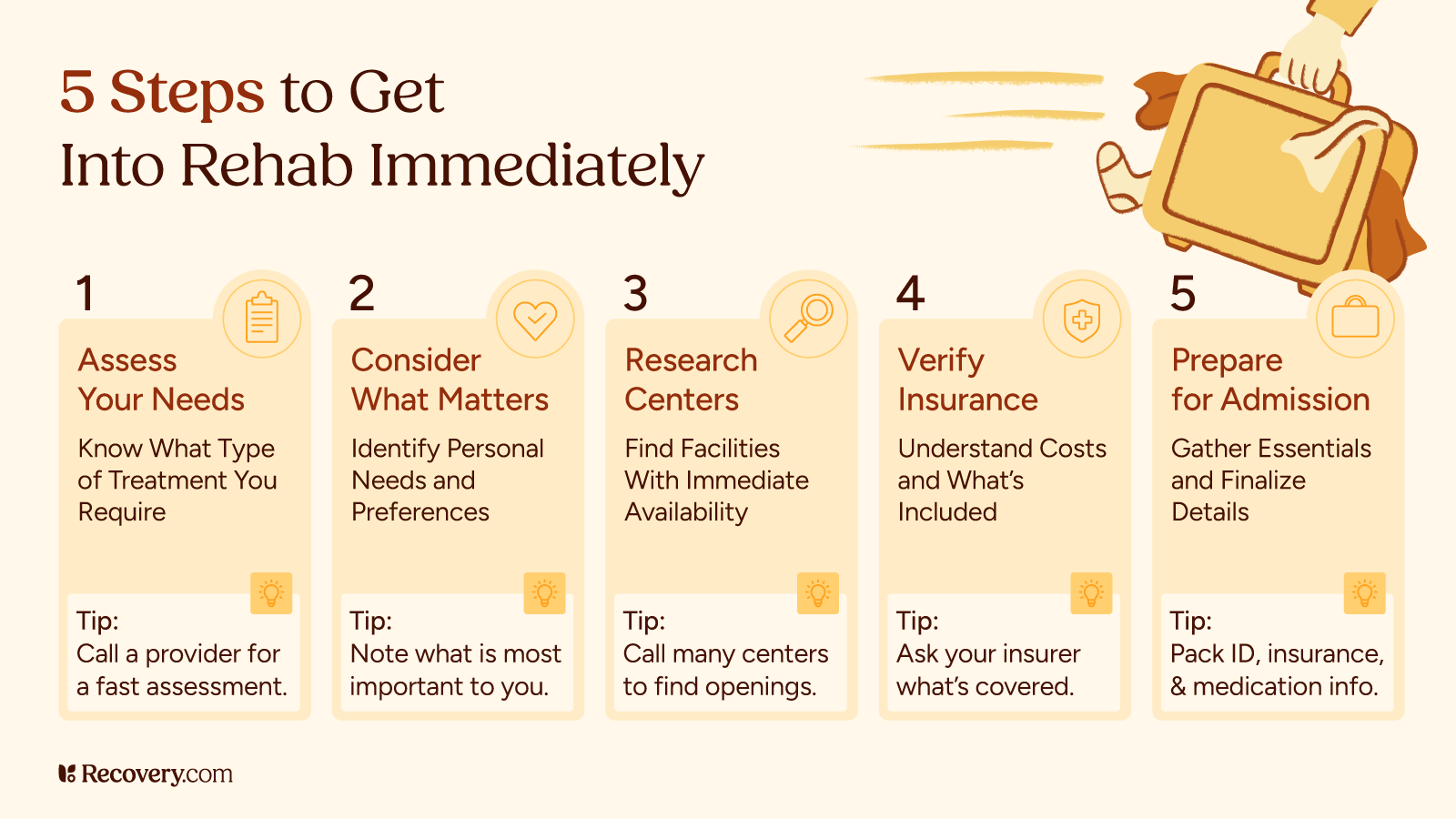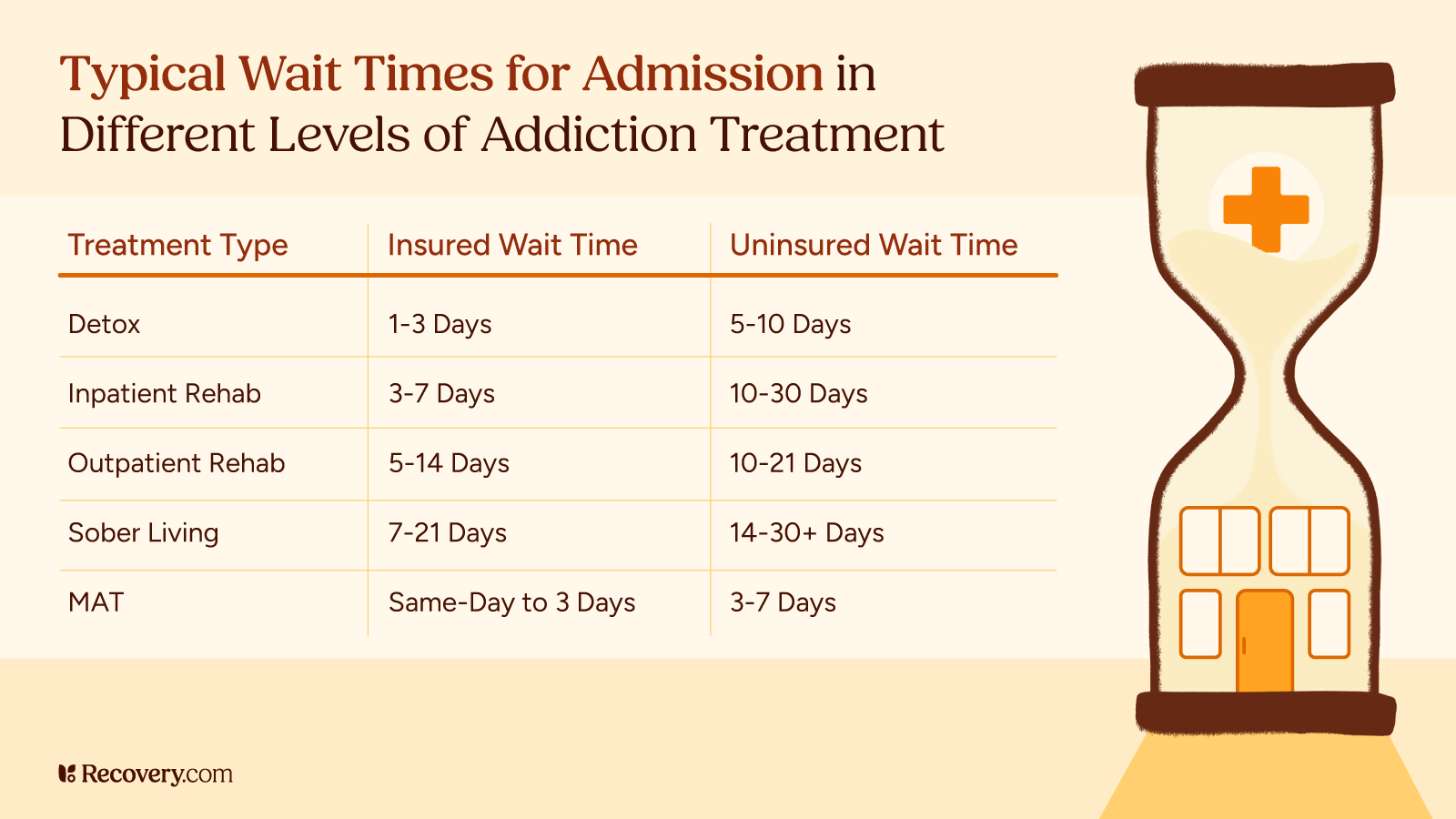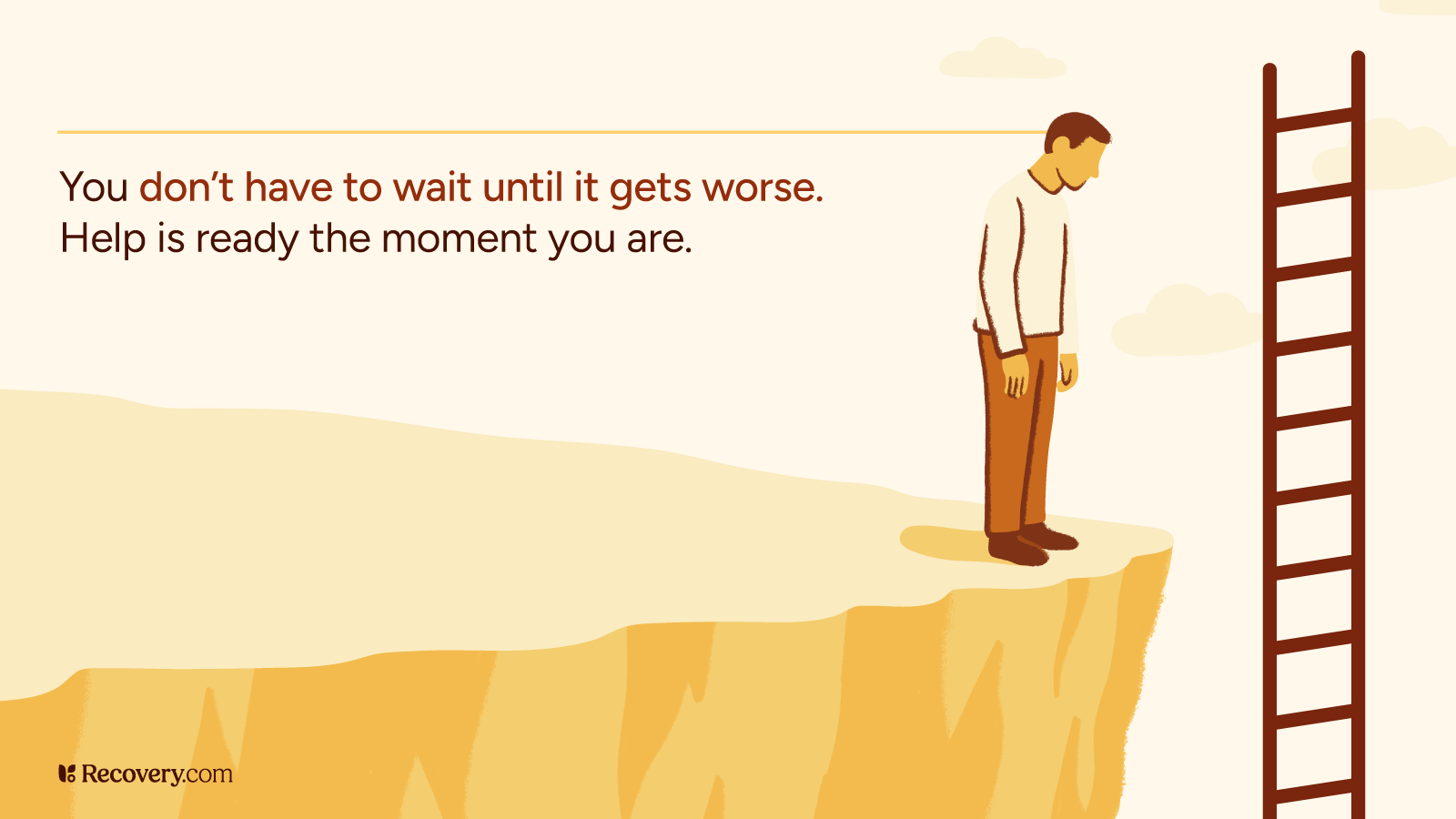How to Get Into Rehab Immediately: 5 Steps to Start Treatment Today


Kayla holds over 6 years of experience in the rehab space, including in-house content management at a leading treatment center. She believes addiction and mental health issues are universal human experiences that can serve as important entry points onto a path toward self-realization and well-being.



Kayla holds over 6 years of experience in the rehab space, including in-house content management at a leading treatment center. She believes addiction and mental health issues are universal human experiences that can serve as important entry points onto a path toward self-realization and well-being.
Table of Contents
- 1. Assess your needs
- 2. Consider what matters to you
- 3. Research treatment centers
- 4. Verify insurance coverage
- 5. Prepare essential information
- Using hotlines and support networks
- Considering state-funded and non-profit rehabs
- What to do if you encounter a waitlist
- Getting ready for admission
- The role of intervention services
- Aftercare planning
- FAQ
Recognizing you need help for addiction is a brave and life-changing realization. Getting immediate treatment through rehab is a great way to start your recovery journey. Breaking free from addiction requires support, a safe environment, and resources that rehab programs offer.
The consequences of addiction get worse over time. The longer it’s left untreated, the more the risks increase. By getting immediate help, you’re empowering yourself to stop the cycle of addiction before it causes further harm.
Here’s how you can get into rehab immediately and begin the work of changing your life.

Steps to Take for Immediate Rehab Admission
1. Assess Your Needs
Talk to a professional.
Start by figuring out what kind of help you need. It may help to talk to your therapist, healthcare provider, or other qualified medical professional. Most rehab admissions staff can give you an initial assessment over the phone as part of their intake and admissions process. Just keep in mind that admissions staff are also essentially the rehab’s sales team, so not all the guidance they provide will be unbiased.
Take an assessment.
You can also do a self-assessment using online resources like the screening tools provided by the National Institute on Drug Abuse (NIDA).1 This can give you a starting point for understanding your situation, but it shouldn’t replace professional advice.
An initial assessment helps you get clarity on how severe your addiction is, whether you need medically supervised detoxification, and any special requirements you might have, like treatment for co-occurring mental health conditions.
Determine your level of care.
This process also helps determine what type of treatment you need. Inpatient drug or alcohol rehab is generally recommended if you have a severe addiction, need a supportive recovery environment, or are at high risk of relapse. Intensive outpatient rehab programs work better if you have a “high-functioning” addiction, a stable living situation, and a strong support system.
Find out if you need detox.
If you’ve been struggling with opioid, benzo, or alcohol use, you might need to detox under medical supervision before starting rehab. This helps you address dependency and safely manage withdrawal symptoms while reducing your risk of relapse during the withdrawal phase. Your doctor or treatment facility can help you figure out if you need medical detox.

2. Consider What Matters to You
Beyond your essential needs, think about what would make your time in rehab comfortable and effective.
You might consider location—do you want to go to a rehab near you, in another state, or even abroad? Think about the client population, too. Is it important for you to attend a center with gender-specific programs or LGBTQ+-affirming care?
What about facilities? Do you need access to a gym, nature trails, or other amenities? Will you need to work during treatment? Are there specific activities or therapeutic approaches that would help you?
If you have co-occurring mental health disorders like trauma or mood disorders, you’ll want a program that addresses these during treatment. And if you’re neurodivergent, you might need a rehab program that can accommodate your specific needs.
If you’re neurodivergent and seeking addiction care, check out our comprehensive guide to finding addiction treatment as a neurodivergent person for tailored approaches that respect your needs.
3. Research Treatment Centers
Now that you know what you need, it’s time to look into your options.
Use a search tool.
You can use an online treatment finder like Recovery.com to search for programs based on your criteria. Just be aware that not all treatment directories are ethical—many are owned by treatment centers and designed to refer clients to their own programs.
Learn more about the dangers of referral fees for rehab treatment.
Use the Substance Abuse and Mental Health Services Administration (SAMHSA)’s resources.
Another great resource is SAMHSA’s National Helpline (1-800-662-HELP), which is answered 24/7 by trained staff who can provide information and refer you to substance abuse treatment. You can also contact your insurance provider to understand your covered treatment options and locate in-network facilities with immediate openings.
Ask the right questions.

Once you’ve identified some potential programs, ask questions to gather good information. Find out if they have immediate availability, what level of care they provide, and whether they specialize in treating your specific condition. Ask if they accept your insurance and what the cost of treatment will be.
Learn about their treatment approach, what evidence-based therapies they offer, what amenities they have, and what their aftercare program looks like. These conversations will help you choose the rehab center that best meets your needs and preferences.
Learn more about making an informed choice in our guide on what to ask when calling a rehab center for the first time.
4. Verify Insurance Coverage
Before you commit to a rehab program, look into what your insurance plan covers so you can plan for costs. Contact your insurance provider and explain that you’re seeking immediate admission to rehab. Ask about your coverage for substance use disorder treatment, including coverage for emergency rehab admissions, in-network facilities with immediate availability, copays, deductible, and out-of-pocket expenses, and any prior authorization requirements.
Insurance coverage can be complex, and navigating it alone can be frustrating. The good news is that rehab admissions teams often help clients through this process. Don’t hesitate to ask them for help to make sure you understand your coverage and maximize your benefits for treatment.
5. Prepare Essential Information
To set yourself up for a smooth transition, gather the documents you’ll need for a quick admission. You’ll typically need:
- A government-issued photo ID, such as your driver’s license or passport
- Social Security number
- Proof of address (utility bill, rental agreement)
- A list of medications you’re currently taking and any relevant medical records
- Insurance information (insurance card, member ID number)
Every treatment center is different, so talk to yours to confirm exactly what they’ll need from you.
Using Hotlines and Support Networks
Getting into rehab can be challenging, but you don’t have to figure it out alone. Numerous resources offer immediate guidance and support.
The SAMHSA National Helpline (1-800-662-HELP) is available around the clock. This confidential service is staffed by trained advisors who can help you find rehabs with immediate openings in your area, support you through the intake process, answer your questions about rehab and other addiction treatment options, and connect you with local support groups to start building your sober network.
You can also reach out to the Crisis Text Line by texting HOME to 741741 or chatting with a crisis counselor on their website or via WhatsApp. The Partnership to End Addiction (1-855-378-4373) can help with concerns about a child’s substance misuse. And the National Harm Reduction Coalition has search tools to help you find syringe exchanges or naloxone near you, or you can order naloxone by mail.
Learn more about finding a reputable addiction hotline.
Explore Alcohol Treatment Centers
Considering State-Funded and Non-Profit Rehabs
Navigating Public Assistance Programs
If you have financial limitations, resources are available to help you access immediate drug or alcohol addiction treatment. Here are some options to explore:
- State-funded programs: Many states offer publicly funded addiction treatment programs for people struggling with alcohol or drug addiction. These programs often cater to low-income residents and may provide immediate placement in drug rehab facilities. Contact your state’s health department or mental health agency for information.
- Non-profit organizations: Many non-profits are dedicated to supporting people with addiction. They may offer scholarships or financial assistance to cover rehab costs, or run faith-based treatment programs with reduced costs. Research non-profits in your area to learn about their services and eligibility requirements.
- National hotlines: SAMHSA’s National Helpline (1-800-662-HELP) can also offer guidance on navigating public assistance programs and connect you with relevant resources.
By exploring these reduced-cost options, you can find the support you need to start recovery, even with limited resources.
Learn more about covering treatment costs in our guide to paying for rehab.
Application Process for Public Assistance
Accessing public assistance for rehab involves some extra steps. But with the right guidance, you can navigate the process effectively. Here’s what to expect:
- Contact your state’s health department or mental health agency. They can provide information on available programs and eligibility requirements in your area.
- Gather the necessary documents. This may include proof of residency and any medical documentation related to your addiction.
- Complete an application form. This form will gather details about your situation and assess your eligibility for assistance.
- Prepare for your interview. A caseworker might interview you to clarify your needs and verify your information.
- Wait for a decision. Processing times can vary, so be patient and stay connected with the program during this period.
Public assistance programs can help lower financial barriers on your path to recovery.
What to Do if You Encounter a Waitlist
Exploring Alternative Options
Encountering a waitlist for rehab can be discouraging, but it doesn’t have to stall your progress. Here are some options to explore while you wait:
- Seek outpatient services: While inpatient rehab offers intensive care, outpatient programs can still provide valuable support. These programs allow you to work your treatment plan while continuing daily life, offering individual and group therapy, medication management, and relapse prevention skills.
- Join support groups: Connecting with others who have similar experiences can be hugely helpful. Support groups offer a space to share experiences, find inspiration, and build your sober community. Look for local 12-step programs like Alcoholics Anonymous (AA) or Narcotics Anonymous (NA), or find support groups specific to your addiction.
- Consider medication-assisted treatment (MAT): MAT uses prescription medication to help people manage opioid addiction. Discuss this option with an addiction-specialized doctor to determine if it’s right for you.
Being on a waitlist doesn’t have to mean complete stagnation. By taking alternative measures, you can maintain momentum toward addiction recovery while you wait to start treatment.
For more on this, see our article on what to do if a rehab is waitlisted.
Keeping Multiple Options Open
There are steps you can take to increase your chances of immediate rehab placement. Consider these strategies:
- Apply to multiple facilities. Don’t limit yourself to a single program. Apply to multiple rehabs and expand your search if necessary.
- Be upfront about your situation. Inform each facility about your waitlist status at your preferred program and your eagerness to start treatment immediately. This positions you for earlier admission if openings arise.
- Follow up regularly. Stay in touch with admissions. Inquire about openings and reiterate your interest in starting treatment as soon as possible.
By being persistent and exploring multiple options, you can increase your chances of getting admitted earlier and starting your recovery journey sooner.
Preparing for Admission
Once you’ve secured a place in rehab, you can start to prepare for treatment mentally, emotionally, and practically.
- Pack. Pack comfortable clothing suitable for the center’s location and weather. You won’t be going out much, so just bring the essentials. Most facilities restrict certain items, so check with staff about what to bring.
- Decide how you’ll get there. Arrange reliable transportation. It’s helpful to have a sober buddy accompany you for the trip. Ask a trusted friend or family member, or ask your rehab about transfer options.
- Mentally prepare. Starting rehab can bring up a lot of emotions. Acknowledge these and process them by journaling, talking to your therapist, or talking with a trusted friend.
Use our rehab packing list to get ready for your stay.
Managing Personal Affairs
Before entering rehab, make arrangements to take care of your responsibilities while you’re away. Discuss your leave of absence with your supervisor, following your company’s policies and procedures.
- Inform your employer. Discuss your leave of absence with your supervisor, following company policies and procedures.
- Delegate responsibilities. Arrange for someone to handle tasks like childcare, pet care, or paying bills during your absence.
- Communicate with loved ones. Briefly inform close family and friends about your upcoming stay in rehab.
Starting rehab is a big step. Easing your transition by preparing logistically and emotionally will help you be ready to focus on long-term recovery.
The Role of Intervention Services
Because denial is a core feature of addiction, people in the midst of active use often don’t realize how serious their problem is. It often takes an outside perspective to point it out.
In some cases, an intervention facilitated by a professional can help. Interventionists work with families to plan a structured conversation, encouraging people to accept help and start treatment. An interventionist can guide you through the process, help you navigate charged emotions, and present the benefits of rehab in a clear and supportive way.
Get tips for staging an intervention here.
Aftercare Planning
In recovery, rehab is just the beginning. Your rehab should provide a robust continuing care plan to help you transition back into daily life and prevent relapse after treatment. This might involve:
- Stepped-down care such as intensive outpatient treatment or sober living
- Online aftercare programs, usually offered for up to 90 days following inpatient treatment
- Ongoing individual therapy and help finding a therapist
- An alumni network that holds regular online or in-person meetings
- Retreats or refresher courses to reenergize your recovery
- Connection with resources in your community like recovery support groups
- Identifying people in your existing support network who will continue to support your healing process
Your continuing care plan should contain some combination of these elements to support your needs after treatment.
Start Treatment as Soon as Possible for Better Recovery Outcomes
Getting addiction help is a powerful turning point in life—it’s the moment you decide to reclaim control and open the door to new possibilities. Every recovery journey has a beginning, and taking proactive steps to enter rehab as soon as possible sets the foundation for healing and transformation.
It’s hard to reach out when you really need it, but doing so is a way of having your own back that’s a powerful start to building self-trust. You deserve support, and there are people ready to help you navigate this path. The challenges you’re facing don’t have to define you.
Search for addiction treatment centers that meet your criteria and contact them directly about availability. Though it might feel overwhelming now, this one phone call could be the first step toward your well-being. Your future self will thank you for the strength you’re showing today.
FAQs
Q: How can I get admitted to a rehab facility immediately?
A: The fastest way to get same-day admission is to call facilities and ask if they have immediate openings. Then contact your health insurance company to find out which ones are covered. Be ready to provide personal information, medical history, and insurance details during the intake process. If you need drug or alcohol detox, some programs may prioritize you based on how severe your withdrawal risk is.
Q: How can I find a rehab center with immediate availability?
A: Use online tools like Recovery.com, call SAMHSA’s helpline, or ask your insurance provider about in-network facilities that can take you right away. Don’t just apply to one center—try several at once to increase your chances. If getting help quickly is your main priority, try to be flexible about things like location and amenities.
Q: What should I do if I’m on a waiting list for an inpatient treatment program?
A: Don’t just sit and wait—look into outpatient programs in your area, join support groups like AA or NA, or talk to a doctor about medication-assisted treatment if it’s appropriate for your situation. Apply to multiple facilities to improve your chances of getting in somewhere sooner. Keep in regular touch with admissions departments to check for openings from cancellations. Use this waiting time to get yourself mentally prepared and to take care of practical matters before you start treatment.
Q: How can I find a rehab facility with immediate openings?
A: Widen your search area—looking a bit further from home might reveal places that can take you right away. Consider both inpatient and outpatient options, as outpatient programs often have shorter wait times. Call your insurance provider directly and ask specifically for in-network facilities that can accept new patients quickly. It’s usually better to call treatment centers directly instead of relying on their websites, as availability changes frequently and websites aren’t always updated right away.
-
National Institute on Drug Abuse. Screening and Assessment Tools Chart | National Institute on Drug Abuse (NIDA). 6 Jan. 2023, https://nida.nih.gov/nidamed-medical-health-professionals/screening-tools-resources/chart-screening-tools.
Our Promise
How Is Recovery.com Different?
We believe everyone deserves access to accurate, unbiased information about mental health and recovery. That’s why we have a comprehensive set of treatment providers and don't charge for inclusion. Any center that meets our criteria can list for free. We do not and have never accepted fees for referring someone to a particular center. Providers who advertise with us must be verified by our Research Team and we clearly mark their status as advertisers.
Our goal is to help you choose the best path for your recovery. That begins with information you can trust.







